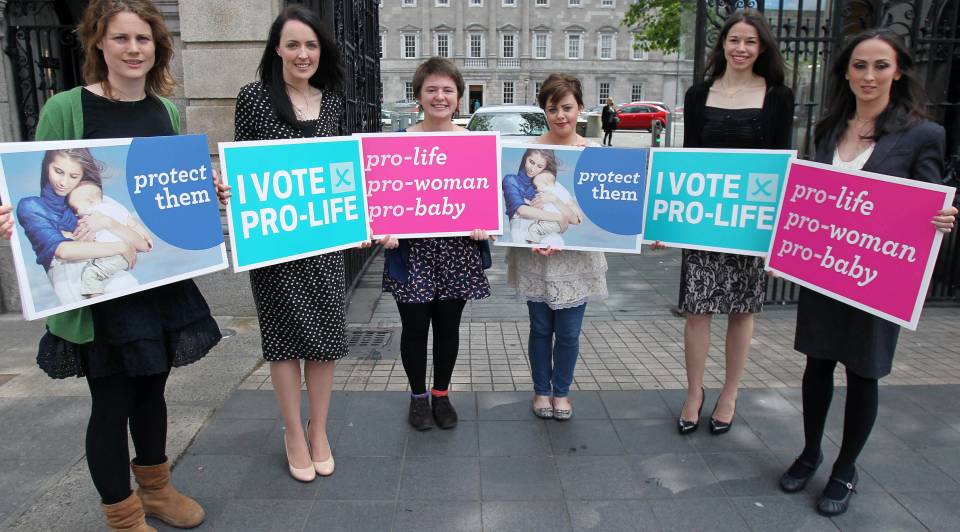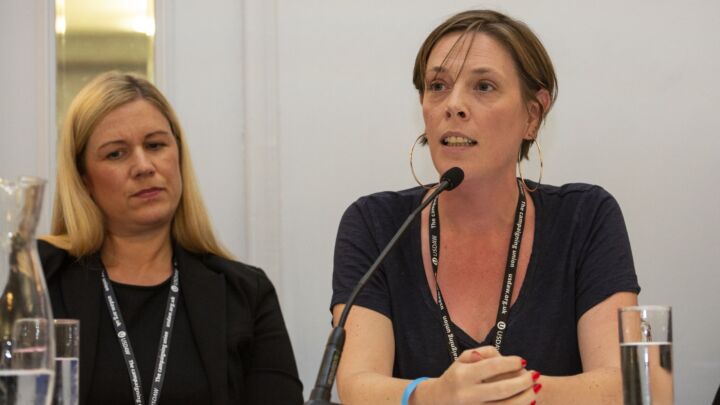The pro-choice lobby should celebrate, not censor debate
Ann Furedi on the moral cowardice of No Platforming anti-choice activists.

Want unlimited, ad-free access? Become a spiked supporter.
I am no stranger to protest and pickets. I’ve organised, and participated in, a fair few myself – particularly during my student days, when no self-respecting political activist would judge a meeting successful unless it provoked objections, complaints, protests or interventions. Heckling was an artform. When you organised a meeting, you appointed stewards in case someone a bit more beefy than the chair was needed to keep order.
But until last week, when I turned up to Cambridge University’s Trinity College to take part in a discussion on abortion, I had never encountered a political protest asking people not to attend a debate. In my day we protested at meetings where debate was prevented; usually we were excluded and wanted to join in and have our say.
The debate I took part in was organised by Cambridge Students for Life, who oppose abortion, and Cambridge Medicine Society, and was intended as a supplement to a module in the Medicine Tripos. The motion was: ‘Genetics and disability should not be used as grounds for abortion.’
The head of the Right to Life Campaign, Peter Williams, and Phillipa Taylor from the Christian Medical Fellowship were there to support the motion. The opposition was made up of Jane Fisher, the extremely compelling head of Ante-Natal Results and Choices, a charity that provides advice and support for couples who face a diagnosis of fetal anomaly, and me, CEO of the unapologetic abortion provider, the British Pregnancy Advisory Service (bpas).
The point of the protest organised by the Cambridge University Student Union Women’s Campaign was to persuade people not to attend the debate. My suggestion that their time would be better spent in the hall, arguing for women’s reproductive choice, met these rebuttals:
‘The motion is biased’
Yes, that’s because it’s a debate and one side supports the motion and the other opposes it, and so a neutral motion wouldn’t work very well.
‘The speakers are biased because they’ve been selected by the anti-abortion side. They will have deliberately asked weaker people to oppose it.’
Ouch. That hurt.
‘There’s a hidden agenda. The anti-abortion lobby knows it will get more support opposing abortion for disability than if it opposes abortion in general, because abortion for disability makes the pro-choice side seem eugenic and it’s hard to argue that it’s not the same as discrimination against people with disabilities.’
Yes, having this argument is a challenge – and it’s true that the anti-choice lobby prefers to select issues that make people feel uncomfortable. That is why it also focuses on late abortion, gender-selection abortions, and fetal anomaly. But this is precisely why we have to challenge these critics of the right to choice and explain our case. A debate is a good test of whether we can argue convincingly for our principles. If we fail, then we need to do better in future.
‘But if you give these people credibility by joining the debate there’s a risk that some people will listen to them and be convinced.’
But if you don’t join the debate, people will only hear their side of the argument and be much more likely to be convinced.
‘That’s why No Platform polices exist, so that people don’t hear their arguments.’
But doesn’t that suggest that you want to silence your opposition because you can’t match their arguments? In other words, you don’t want to let them speak out because you’re afraid you can’t convince people that they are wrong.
‘Well, we are afraid of that.’
Speechless!
Later, the debate about the debate continued in the Cambridge student newspaper, Varsity, where the CUSU Women’s Campaign stacked up its ‘debate is bad’ case, arguing that ‘whenever reproductive rights are debated, legitimacy is given to anti-choicers and we put our access to reproductive rights (which are already at risk, and always contested) in serious danger’. A statement issued by protesters said: ‘Debate is a conversation of power, where the objective is to win, to overpower the other side. This is violence. It is not “discussion”.’
That students at one of Britain’s leading universities should sink to such intellectual depths is nothing short of tragic. Had the protesters attended the debate they would have found nothing ‘violent’; they would have seen an intelligent discussion between people with different views about morals and principles, the nature of human life and its value. The debate was fair, the speakers were considered, and the questions and points from the audience deserved to be answered. This was a sensible and respectful discussion. I listened to my opposition, and I learned. I came away with none of my pro-choice convictions diluted – just a better sense of how to present what I believe in a way that may be more convincing.
The anti-abortion movement does indeed employ the tactic of focusing on issues such as disability, gender selection and later procedures because they think they are easier issues on which to gain public support. Whether they succeed or not depends on how we engage with those arguments – which we won’t do well unless we listen, answer and debate. If we take ourselves and our ideas seriously, debate is absolutely essential both to test and develop our own ideas and to convince others.
Abortion is an issue that we meet in two different spheres. For society, it is a political issue that causes us to consider metaphysics and moral values, definitions of life, the limits of personal autonomy, and the limits on women’s equality. For a woman, abortion is a possible solution to a personal, practical problem of a pregnancy that has caused a crisis in her life. No woman has an abortion to make a statement – nor does her personal choice represent a political statement. A woman who ends a pregnancy affected by Down’s syndrome is simply ending a pregnancy that is a problem for her; she is not making a demonstration of her views on chromosomal anomaly. Our choices about our children are personal and our own.
This is much misunderstood. And last week’s debate was an excellent forum to address these misunderstandings as they relate to fetal anomaly and the law that permits abortion on those grounds. To protest that such a debate should not take place is a muddle-headed, philistine approach. We should welcome the chance to show that there is a moral, humane and intellectually coherent case for supporting reproductive choice. We need to speak out for what we believe in and not gag others.
It is absurd to claim that debate is, by its nature, violent. Pitting your arguments against someone who disagrees with you is one of the best ways to learn to be more clear, concise and precise. Formal debate, such as that which takes place at Cambridge, is a celebration of control and ordered argumentation and rhetoric. There’s an agreed motion, two sides with different views, protected time to say your piece, to challenge and to rebut your opponent. There’s a moderator to keep order and an audience to vote. (Although last week, sadly no vote was called.) Frankly, taking on able and informed opponents of my views was a challenge, but my opponents in the debate were far less hostile than the row of protesters who purported to agree with me about women’s rights but whose signs told me explicitly to ‘Fuck off’.
You don’t have to be a Cambridge intellectual to understand why debate and discussion should be encouraged. When you try to silence someone, you simply tell the world that you fear what they might say. We have no need to fear the arguments of the anti-choice movement. And we owe those who want to hear ours the chance to do so.
Ann Furedi is chief executive of bpas, the British Pregnancy Advisory Service.
You’ve read 3 free articles this month.
Support spiked and get unlimited access.
Help us hit our 1% target
spiked is funded by readers like you. It’s your generosity that keeps us fearless and independent.
Only 0.1% of our regular readers currently support spiked. If just 1% gave, we could grow our team – and step up the fight for free speech and democracy right when it matters most.
Join today from £5/month (£50/year) and get unlimited, ad-free access, bonus content, exclusive events and more – all while helping to keep spiked saying the unsayable.
Monthly support makes the biggest difference. Thank you.










Comments
Want to join the conversation?
Only spiked supporters and patrons, who donate regularly to us, can comment on our articles.